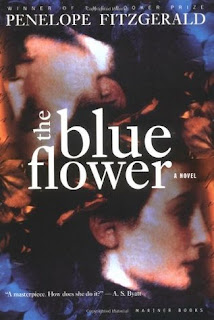The Blue Flower
I'm reading a biography of Penelope Fitzgerald, the British writer, and I hadn't read any of her novels. I thought it would be a good idea to sample one, so I picked The Blue Flower, her last book, written in 1995. I was somewhat captivated, but I found it a little wanting in the excitement area.
It is a novelization of the early life of Friedrich van Hardenberg, would become the German philosopher and romantic poet known as Novalis. Now, German philosophy and poetry is not something I'm well acquainted with--if a category on Jeopardy! came up with that title, I'd steer clear of it. But the book has some cameos by people I have heard of, namely Goethe and Schlegel.
The thing is, all of this takes place before Fritz, as he is known to family and friends, becomes a writer. The action in the book covers his life while he studies in various schools, in preparation to take a job where his father works, at the bureau of salt mines. When he is visiting friends he falls in love with a 12-year-old girl, Sophie, and is determined to marry her, no matter what anyone thinks.
I guess in the 1790s a topic like that is much more romantic than it would be today, when it would be criminal. Sophie is a great beauty to Fritz, but everyone else tells her she's nothing special, especially his brother Erasmus. Fritz tells him, "'You think I have been taken in by a beautiful face' 'No, I don't,' Erasmus protested. 'You are taken in, yes, but not by a beautiful face. Fritz, she is not beautiful, she is not even pretty. I say again, this Sophie is empty-headed, moreover at twelve years old she has a double chin.'"
The Blue Flower's title is a metaphor. According to the introduction by Candia McWilliam: "The blue flower, signifying that elusive thing which can connect the individual self to an understanding of greater external existence, finds its equivalent in the novel which itself is a concrete rendering of the abstraction it contemplates. The Blue Flower constitutes for its reader a blue flower."
Though the book is not exactly a page-turner, I found various instances that I enjoyed, mostly with little epigrams, like "'A word of advice. If, as a young man, a student, you are tormented by a desire for women, it is best to go out into the fresh air as much as possible.'" Or, "'The civilized world could not exist without its multitude of copying clerks, and they in turn could not exist if civilisation did not involve so many pieces of paper.'"
The Blue Flower is a carefully crafted, delicate book, as if made of crepe paper. I like my prose to have a meatier quality, but I didn't dislike the book, I just wasn't much interested in what was going on. So far I find the biography of Fitzgerald much more interesting.
It is a novelization of the early life of Friedrich van Hardenberg, would become the German philosopher and romantic poet known as Novalis. Now, German philosophy and poetry is not something I'm well acquainted with--if a category on Jeopardy! came up with that title, I'd steer clear of it. But the book has some cameos by people I have heard of, namely Goethe and Schlegel.
The thing is, all of this takes place before Fritz, as he is known to family and friends, becomes a writer. The action in the book covers his life while he studies in various schools, in preparation to take a job where his father works, at the bureau of salt mines. When he is visiting friends he falls in love with a 12-year-old girl, Sophie, and is determined to marry her, no matter what anyone thinks.
I guess in the 1790s a topic like that is much more romantic than it would be today, when it would be criminal. Sophie is a great beauty to Fritz, but everyone else tells her she's nothing special, especially his brother Erasmus. Fritz tells him, "'You think I have been taken in by a beautiful face' 'No, I don't,' Erasmus protested. 'You are taken in, yes, but not by a beautiful face. Fritz, she is not beautiful, she is not even pretty. I say again, this Sophie is empty-headed, moreover at twelve years old she has a double chin.'"
The Blue Flower's title is a metaphor. According to the introduction by Candia McWilliam: "The blue flower, signifying that elusive thing which can connect the individual self to an understanding of greater external existence, finds its equivalent in the novel which itself is a concrete rendering of the abstraction it contemplates. The Blue Flower constitutes for its reader a blue flower."
Though the book is not exactly a page-turner, I found various instances that I enjoyed, mostly with little epigrams, like "'A word of advice. If, as a young man, a student, you are tormented by a desire for women, it is best to go out into the fresh air as much as possible.'" Or, "'The civilized world could not exist without its multitude of copying clerks, and they in turn could not exist if civilisation did not involve so many pieces of paper.'"
The Blue Flower is a carefully crafted, delicate book, as if made of crepe paper. I like my prose to have a meatier quality, but I didn't dislike the book, I just wasn't much interested in what was going on. So far I find the biography of Fitzgerald much more interesting.



Comments
Post a Comment